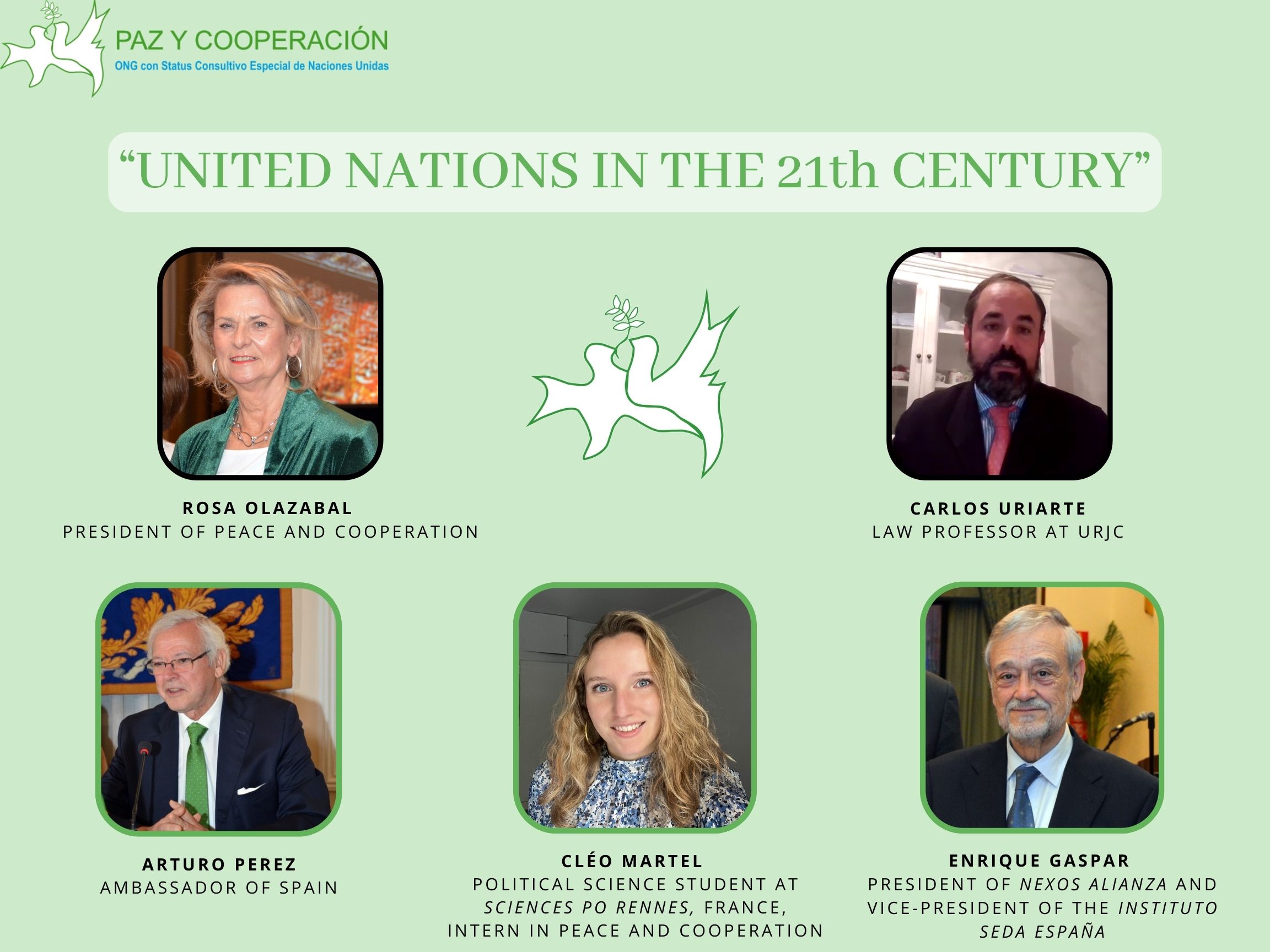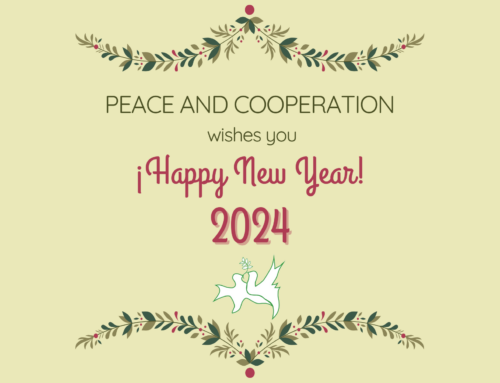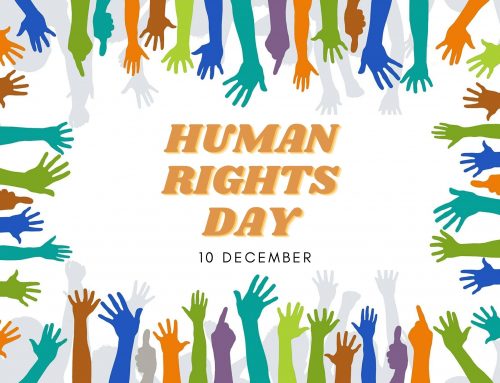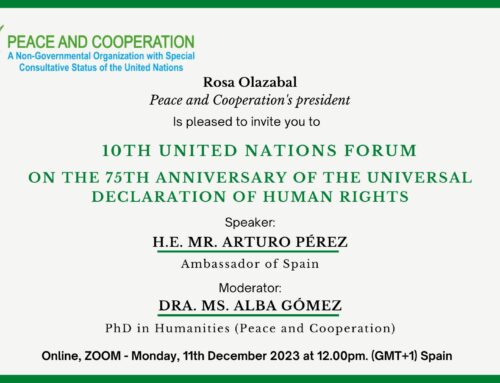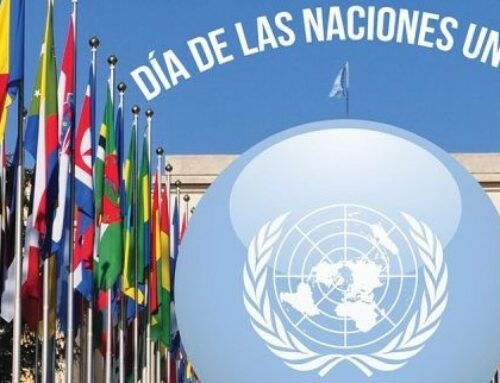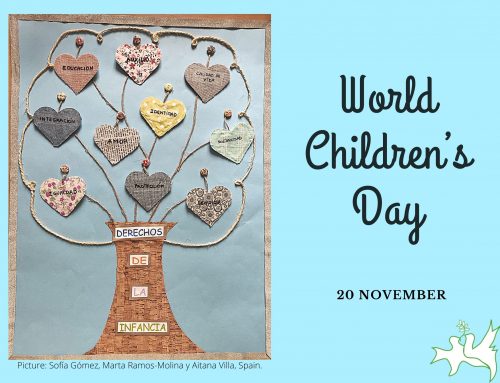Peace and Cooperation organised on Thursday 3th November 2022 a lecture on “the United Nations in the 21st century” to celebrate the United Nations Day (24th October).
Peace and Cooperation was pleased to have among the speakers Rosa OLAZABAL, President of the Foundation Peace and Cooperation; Arturo PÉREZ, Ambassador of Spain; Cléo MARTEL, political science student at the University Sciences Po Rennes in France and intern at the Fondation Peace and Cooperation; Enrique GASPAR, President of Nexos Alianza and Vice-President of the Instituto Seda España; Carlos URIARTE SANCHEZ, moderator of the lecture, law professor at the University Rey Juan Carlos in Madrid and Patron of Peace and Cooperation.
The President of Peace and Cooperation, Rosa OLAZABAL, began the lecture with a speech, reminding us that United Nations Day ( 24th October) celebrates the anniversary of the entry into force of the 1945 United Nations Fundamental Charter. As stated by Rosa OLAZABAL, “this date offers an opportunity to broaden our common agenda and reaffirm the purposes and principles of the UN Charter”. One of the purposes of Peace and Cooperation is to promote the ideals of the fundamental text to citizens and institutions in order to face the great challenges of the 21st century and build a better world for future generations. The President of Peace and Cooperation concluded her speech quoting the words of the Secretary General of the United Nations, Antonio GUTERRES, on the occasion of United Nations Day.
Then, the youngest of the speakers, Cléo MARTEL, spoke about the great issues Humanity is facing at the beginning of the 21st century: new technologies, inequalities and discrimination, rise of demography and lack of food, authoritarian regimes, internal conflicts, external conflicts and violence. As she reminded us, climate change is the greatest challenge the “human family” is facing because it threatens its own survival. “In our globalised world, multilateralism is more a necessity than a choice”. Thus, she highlighted that these great challenges can not be resolved unilaterally. The role of the United Nations is essential because the United Nations appear to be the only international institution able to maintain global dialogue. Too often, responses are not enough to solve the emergencies, especially the climate emergency. That is why we must keep on working, so that States can provide common responses to these major issues. Cléo MARTEL concluded her speech by stating that “the work of the United Nations has never been more necessary than at the beginning of the 21st century”.
Enrique GASPAR spoke on “the United Nations in the 21st century” reminding us that the United Nations Fundamental Charter, and the following texts, refer not to States but to peoples. In order for the General Assembly to make the best decisions for the people and not for the States, Enrique GASPAR expressed the idea of reforming the institution by integrating civil society within it. He also highlighted the excesses of globalisation, liberalism and unilateralism that have led to the strengthening of inequalities between peoples, the violation of Human Rights and the deterioration of our environment. Enrique GASPAR reminded us that the founding Charter of the United Nations is the best expression of democratic multilateralism and that it is thus necessary to reform and work in order to enshrine this principle in our society and to fight against the major challenges the Humanity is facing: first, climate change and the deterioration of our environment, inequalities between and within peoples, the inclusion of women and minorities, etc.
Antonio PEREZ spoke about his experience with Joaquin ANTUÑA, Founder and former president of Peace and Cooperation, and dedicated his words to the extraordinary work he did with the United Nations and his Foundation. He shared many memories with Joaquin ANTUÑA. According to him, the Founder of Peace and Cooperation showed a great intellectual and humanist level through his columns on Galicia Digital which allowed the values and the work of the United Nations to be known by the public opinion. For the work Peace and Cooperation has done, the Foundation was designated as Messenger of Peace by the United Nations in 1987. Also, the Foundation was granted the status of Special Consultant of the United Nations Economic and Social Council in 1999, for its educational merits, among these are the Peace and Cooperation School Award and the celebration of the International Day of No Violence and Peace with school children.
Finally, Carlos URIARTE SANCHEZ concluded the lecture by thanking the speakers and participants. The President of Peace and Cooperation, Rosa OLAZABAL, invited them to participate in the Foundation’s next activities.
Eduardo Guaylupo
Article published in Galicia Digital

